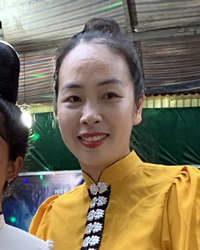Tai Dam in Laos

Photo Source:
Anonymous
|
Send Joshua Project a map of this people group.
|
| People Name: | Tai Dam |
| Country: | Laos |
| 10/40 Window: | Yes |
| Population: | 29,000 |
| World Population: | 949,500 |
| Primary Language: | Tai Dam |
| Primary Religion: | Ethnic Religions |
| Christian Adherents: | 0.20 % |
| Evangelicals: | 0.18 % |
| Scripture: | New Testament |
| Ministry Resources: | Yes |
| Jesus Film: | Yes |
| Audio Recordings: | Yes |
| People Cluster: | Tai |
| Affinity Bloc: | Southeast Asian Peoples |
| Progress Level: |
|
Introduction / History
The Tai Dam, also known as the Black Tai, live in the narrow upland valleys of Khammouan Province in northern Laos. Their tonal language, Tai Dem, belongs to a larger cultural-linguistic grouping of people known as the Tai. The Tai includes the Laotians, the Shans, and others. The Tai Dam, together with the White Tai, were named for the color of their women's blouses.
Due to pressure from the Chinese, the Tai emigrated south and made their homes along the Red and Black River and in the landlocked country of Laos. Most of the Tai Dam live in Vietnam, but they also have communities in China, Laos and Thailand. This people group also has a diaspora in France and the United States.
What Are Their Lives Like?
The Tai Dam live in valleys where they cultivate wet rice, making use of irrigation and terraces. They also farm on mountainsides and grow opium as a cash crop. They are organized into small village territories, each limited to a single valley. Although most of the Tai Dam are farmers, many who live along trade routes have specialized occupations, such as blacksmithing. Chinese merchants visit Tai Dam villages. Since new road construction projects are allowing more accessibility, they often travel to sell their items.
The Tai Dam are unusually respectful and hospitable. They teach their children from a young age to accept a code of social behavior based on respect for those who rank higher. They organize their society on the basis of age, occupation, wealth, and residence. Within this hierarchy, farmers have a place below the artisans, merchants, and city government officials, and the clergy are a separate group.
Each village is under the control of the chao muong, or prince, to whom the common people pay taxes. Tribesmen have citizenship in Laos, but most of them have no actual representation in the government.
The family is the basic unit of their society. They live, eat and farm together. Entire immediate families often live together under one roof, and there is mutual respect for one another at all levels. Sometimes newly married couples live with the wife's family until they can establish their own home.
The Tai Dam is a patriarchal society, meaning that the oldest male is the head of the tribe. Husbands and wives live in harmony, and there is almost no division of labor by gender. Both the women and men plow, hoe, fish, cook, tend babies, clean house, and wash clothes.
What Are Their Beliefs?
The vast majority of the Tai Dam practice ethnic religions. Buddhism is also mixed with folk animism. They believe that non-human objects have spirits, and that people have multiple souls. They also believe that there are guardian spirits and "locality spirits," which are identified with different levels of society. These spirits must be appeased so that they might avoid curses and receive blessings.
Ancestor worship is also common among the Tai Dam. They believe that the spirits of their deceased ancestors are alive and need to be cared for. According to Tai Dam beliefs, these spirits can become hungry and dissatisfied when they are not properly appeased, turning into evil spirits. The people pray to these spirits for help and guidance.
Many of the Tai Dam are shamanists, believing in a host of unseen gods and demons. They depend on shamans (priests or priestesses) to cure the sick by magic, communicate with the gods, and control events.
What Are Their Needs?
The Tai Dam need medical clinics to take care of illnesses and injuries. There are not enough medical facilities in their region.
Prayer Points
Pray for Tai Dam decision makers to open their communities to Christ's ambassadors.
Pray the hearts of the Tai Dam people would be stirred to hunger after God, to drink of living water.
Pray that a family-based movement to Christ will soon transform Tai Dam society, blessing them spiritually and economically.
Pray for the Lord to move in the hearts of believers to give up their own rights and sacrifice their lives to see the Tai Dam people blessed by the work of Jesus Christ, the only Savior.